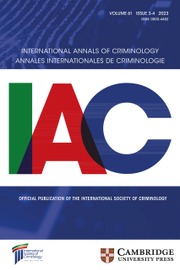Article contents
A Human Security Angle of Conflicts: The Case of Farmer–Herder Conflict in Ghana
Published online by Cambridge University Press: 05 April 2022
Abstract
In Ghana, the economic costs of violent conflicts (loss of jobs and revenue, drop in gross domestic product, and disruption of production chain) have been well documented. However, there is little scholarly work on such conflicts’ human security costs, a critical element in contemporary security management arrangements. This study examines the costs of violent conflicts from a human security perspective using the farmer–herder conflict in the Agogo community in the Ashanti region of Ghana as a case study. A total of 400 participants were randomly and purposely selected. A χ2 test was employed to determine the association of rape, armed robbery, arson and murder with the farmer–herder conflict. The study found that at a 5% margin of error, the p value for armed robbery was 0.01, rape was 0.01, arson was 0.03 and murder was 0.00, indicating a close association between these variables and the conflict.
Abstracto
En Ghana, los costos económicos de los conflictos violentos – pérdida de empleos e ingresos, caída del PIB e interrupción de la cadena de producción – han sido bien documentados. Sin embargo, hay poco trabajo académico sobre los costos de seguridad humana de tales conflictos, un elemento crítico en los arreglos contemporáneos de gestión de la seguridad. Este estudio examina los costos de los conflictos violentos desde una perspectiva de seguridad humana utilizando el conflicto entre agricultores y pastores en la comunidad de Agogo en la región Ashanti de Ghana como estudio de caso. Cuatrocientos participantes fueron seleccionados al azar y deliberadamente. Se empleó una prueba de chi-cuadrado para determinar la asociación de violación, robo a mano armada, incendio provocado y asesinato con el conflicto entre agricultores y pastores. El estudio encontró que con un margen de error del 5%, el valor p para robo a mano armada fue 0,01, violación fue 0,01, incendio provocado fue 0,03 y asesinato fue 0,00, lo que indica una estrecha asociación entre estas variables y el conflicto.
Abstrait
Au Ghana, les coûts économiques des conflits violents – perte d’emplois et de revenus, baisse du PIB et perturbation de la chaîne de production – ont été bien documentés. Cependant, il existe peu de travaux universitaires sur les coûts de sécurité humaine de ces conflits, un élément essentiel des dispositifs contemporains de gestion de la sécurité. Cette étude examine les coûts des conflits violents du point de vue de la sécurité humaine en utilisant le conflit entre agriculteurs et éleveurs dans la communauté d’Agogo dans la région d’Ashanti au Ghana comme étude de cas. Quatre cents participants ont été choisis au hasard et à dessein. Un test du chi carré a été utilisé pour déterminer l’association du viol, du vol à main armée, de l’incendie criminel et du meurtre avec le conflit entre agriculteurs et éleveurs. Lʼétude a révélé qu’avec une marge d’erreur de 5%, la valeur p pour le vol à main armée était de 0,01, le viol de 0,01, l’incendie criminel de 0,03 et le meurtre de 0,00, indiquant une association étroite entre ces variables et le conflit.
抽象的
在加纳,暴力冲突的经济成本(工作和收入损失、GDP 下降和生产链中断)已得到充分证明。 然而,关于此类冲突的人类安全成本的学术工作很少,这是当代安全管理安排中的一个关键因素。 本研究以加纳阿散蒂地区 Agogo 社区的农牧冲突为例,从人类安全的角度研究暴力冲突的成本。 400 名参与者是随机和有意选择的。 使用卡方检验来确定强奸、武装抢劫、纵火和谋杀与农牧冲突的关联。 研究发现,在 5% 的误差范围内,武装抢劫的 p 值为 0.01,强奸为 0.01,纵火为 0.03,谋杀为 0.00,表明这些变量与冲突之间存在密切关联。
الملخص
في غانا ، تم توثيق التكاليف الاقتصادية للنزاعات العنيفة (فقدان الوظائف والإيرادات ، وانخفاض الناتج المحلي الإجمالي ، وتعطيل سلسلة الإنتاج) بشكل جيد. ومع ذلك ، هناك القليل من العمل الأكاديمي حول تكاليف الأمن البشري لمثل هذه النزاعات ، وهو عنصر حاسم في ترتيبات إدارة الأمن المعاصرة. تبحث هذه الدراسة في تكاليف النزاعات العنيفة من منظور الأمن البشري باستخدام الصراع بين المزارعين والرعاة في مجتمع أغوغو في منطقة أشانتي في غانا كدراسة حالة. تم اختيار أربعمائة مشارك بشكل عشوائي ومتعمد. تم استخدام اختبار chi-square لتحديد ارتباط الاغتصاب والسطو المسلح والحرق العمد والقتل بنزاع المزارعين والرعاة. وجدت الدراسة أنه عند هامش الخطأ 5٪ ، كانت القيمة الاحتمالية للسطو المسلح 0.01 ، والاغتصاب 0.01 ، والحرق العمد 0.03 ، والقتل 0.00 ، مما يشير إلى ارتباط وثيق بين هذه المتغيرات والصراع.
Keywords
- Type
- Article
- Information
- Copyright
- © International Society of Criminology 2022
References
- 1
- Cited by


